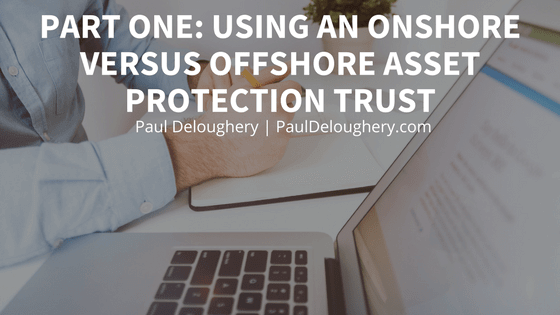I’ve been doing asset production planning since 2004. (What is asset protection? It is the combination of various legal strategies to help shield a client from predator creditors, nuisance lawsuits, and generally losing one’s life savings as a result of an angry customer or an innocent mistake).
When I first started, I was working for my mentor, Attorney John Goodson at a boutique law firm in Phoenix, Arizona. At the time, we would protect a client’s assets using various legal structures such as limited partnerships, limited liability companies, and “friendly” secured liens on assets. What we did was very conservative, and it worked. John would call his plan a Zaibatsu, referring to a complex network of companies in Japan in which money could flow from one company to another as needed. (For example, Mitsubishi was one of the zaibatsu at the beginning of World War II in Japan.)
At the time, in the early 2000s, it was possible to form an asset protection trust (meaning a trust that you set up for yourself and is protected from your creditors). But we didn’t use them. Alaska was the first state to allow such a protective trust for a person. A number of other states have followed suit. However, Arizona still does not allow for such a trust. Therefore, if an Arizona resident wanted to create a trust for his own benefit that was protected from creditors, the assets and accounts could not be located in Arizona. John Goodson did not believe in moving assets out of the state, so that was why we used various other techniques to provide asset protection.
I left John Goodson‘s law firm in 2007 and went out on my own. Since then, I have created domestic, US-based asset protection trusts. Most clients I meet with are skittish about moving their accounts to an unknown trust company on some tiny island in the Pacific Ocean (such as the Cook Islands). So, I have not implemented offshore trusts … until now.
As I have conducted further research into this area, I now realize that (assuming you are a U.S. citizen), if you want the option of taking the chips off the table, you need to include the option of moving your assets out of the U.S.
Why would someone even consider moving assets to some foreign country like the Cook Islands? Well, the reason is the Cook Islands do not recognize US judgments. A creditor in the United States wanting to go after the beneficiary of such a trust would first need to get a judgment in the United States. Then that creditor would need to do asset discovery and figure out that the money is actually not even located in the United States. At that point, the creditor would need to hire a lawyer in the Cook Islands and file a whole new lawsuit. Unfortunately for the creditor (and fortunately for the beneficiary of the trust), in the Cook Islands there is a one-year statute of limitations on fraudulent transfer (or two years from the date the cause-of-action accrued – the reason why the lawsuit was filed). So, it’s possible that the lawsuit in the Cook Islands would be dead in the water before it started. Furthermore, if the creditor did start a lawsuit in the Cook Islands, the debtor/beneficiary could simply choose another trust company in another jurisdiction such as Belize or Panama. The creditor would end up chasing the assets around the world. Most creditors give when they figure this out.
In the next blog, I’ll go further into some of the details of considering naming a Cook Islands trust company as trustee, and why I’m mentioning Cooks Islands rather than any of the other countries that have similar laws.
WARNING: Proper asset protection planning is more complicated than simply forming an asset protection trust. You should NOT play around in this area. Good asset protection attorneys are expensive, but it is worth what you pay them. In future posts, I will discuss more of the details to good asset protection planning, including the use of insurance and business entities, as well as just following good business practice (if you are a business owner). Nothing I have written is intended as legal advice or forming an attorney-client relationship. Feel free to contact me if you want assistance with asset protection planning. However, do not send me any confidential information until I have conducted a conflict check and we have signed an agreement entering into an attorney-client relationship.
Feel free to contact Paul Deloughery at 602-443-4888 if you have any questions. Mr. Deloughery is admitted to practice law in Arizona.
Paul Deloughery is an estate and probate litigation, and law insurance dispute consultant in Scottsdale, Arizona. Visit his website to read more of his blogs or follow him on Twitter!

